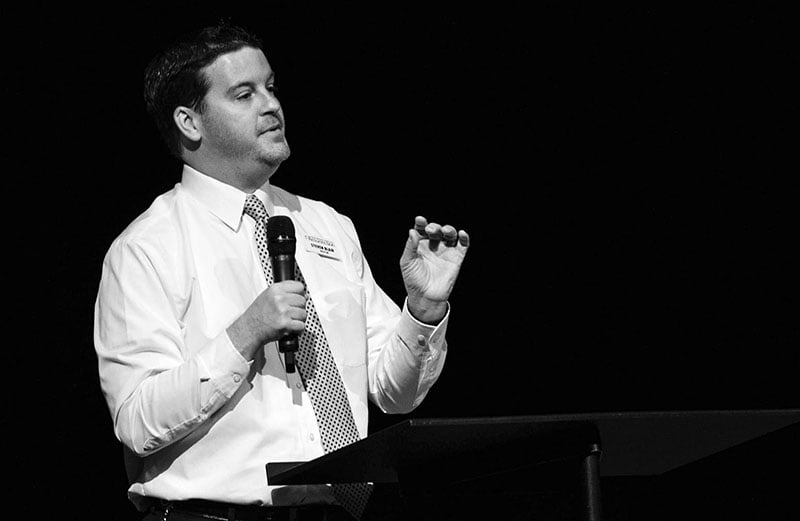
The Rev. Steven Blair, pastor of the United Methodist Church of the Resurrection — who has worked with mental health ministry for four years — focused his presentation on the science of depression.
by Heather Nelson
heather.nelson@theleaven.org
It’s more common than cancer, diabetes or heart disease. But you’d never know it.
Because of the stigma attached to it, mental illness is openly discussed far less than the other three diseases, according to the National Institute of Mental Health. Which means people sometimes lack the information or support they need to seek out a diagnosis or undertake treatment for a mental illness.
But the Greater Kansas City Mental Health Coalition is working to change all that. And it turned first to faith communities for help.
Faith communities can play a significant role in reaching out to individuals and families struggling with a mental illness — especially because that’s where many people turn first in times of crisis. And so, on April 23, Catholic clergy, women religious, lay leaders and others joined religious leaders of other faiths to learn more about how they can help.
The group met at the United Methodist Church of the Resurrection in Leawood for “The Gathering for Mental Health: A Faith-filled Response to Mental Illness.” Its purpose was to inform these leaders of resources available to help their congregations and to share with them ways to offer effective support to others.
Several speakers from a range of faith backgrounds — Methodist, Catholic and Jewish — spoke on topics ranging from the importance of wellness to reducing the stigma to taking action. Michael Scherschligt, executive director of the School of Faith in the archdiocese, and Jacque Pfeifer-Moffitt, doctor of psychology and a parishioner at St. Paul Parish in Olathe, discussed the importance of a relationship with God in their respective presentations on wellness and happiness.
The Rev. Steven Blair, pastor of the United Methodist Church of the Resurrection, has worked with mental health ministry for four years; he focused his presentation on the science of depression. He used the analogy of one thumb swollen to twice the size of the other and argued that no one would try to explain away the visible swelling.
“A person with depression has an inflamed brain and they can’t say, ‘It hurts here,’” said Rev. Blair. “If you get the science right, you can get the care right.”
In his radio show preceding the meeting of religious leaders, Archbishop Joseph F. Naumann suggested the rise in awareness of mental health issues on the church level was sparked by the suicide of a well-known pastor’s son in California a couple of years ago.
Often, said the archbishop, parish staffs don’t feel well equipped to assist in the area of mental health.
“The hope is to make them aware of some of the resources available, and who to refer to and how to network better,” Archbishop Naumann said.
Presenter Joy Koesten agreed.
After recounting the origins of both the Jewish Community Mental Health Coalition and the Greater Kansas City Mental Health Coalition, she stressed the importance of reaching out.
“Mental illness is real. It’s common. More importantly, it’s treatable and there is hope on the other side,” Koesten said. “It’s OK to talk about it — let’s have that conversation.”
Pfeifer-Moffitt and her husband Mike Moffitt, who is both a psychologist and in formation for the permanent diaconate for the archdiocese, hope to see the conversation continue within the archdiocese.
They hope there might ultimately be some type of archdiocesan program focusing on wellness and balance, addressing physical and mental needs.
The morning included several opportunities for prayer, and Father John Riley, archdiocesan chancellor, offered the closing prayer.
“I think what happened today is the clergy that were able to participate were left with a desire to reach out to include the persons who may be on the fringes of their congregations — and families and friends who are affected by mental health concerns,” said Pfeifer-Moffitt.
The Archdiocese of Kansas City in Kansas provides a list of Catholic counselors on its website on the office of marriage and family life page. To view the list, go to: www.archkck.org/catholic-counselors.






